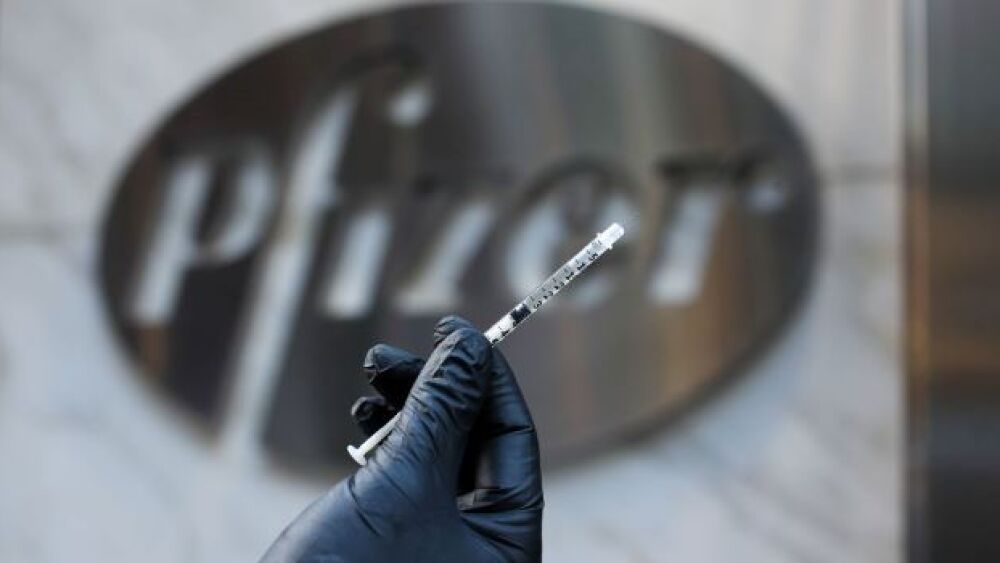HHS issued their announcement, saying, “Americans who have been fully vaccinated do not need a booster shot at this time.”
Tayfun Coskun/Anadolu Agency via Getty Images
Pfizer is briefing U.S. government health officials this week about the need for the booster shot. Several health agencies and vaccine and immunology experts have started pushing back against Pfizer and BioNTech’s assertions that a third shot is necessary.
On July 9, Pfizer and BioNTech reported they planned to request Emergency Use Authorization (EUA) for a third booster shot for their mRNA COVID-19 vaccine. The companies based the decision on early data from a clinical trial that demonstrated a booster dose six months after the second shot had a consistent tolerability profile but still created high immune responses against the Wuhan wildtype strain and the Beta (South African) variant.
The companies also cited data from a Nature study in laboratory tests that showed immune cell levels observed shortly after the second dose of the two-shot regiment had strong neutralization titers against the Delta (India) variant, and the third shot would push it even higher.
They also noted data from the Israel Ministry of Health that showed that the vaccine’s efficacy for preventing infection and symptomatic disease dropped six months after vaccination. However, the vaccine still prevented severe illness and death. The Israeli data shows the Pfizer-BioNTech vaccine was still 93% effective in preventing severe disease and hospitalizations, only a 4% decrease from earlier studies.
The Department of Health and Human Services (HHS) posted a statement after the companies’ issued their announcement, saying, “Americans who have been fully vaccinated do not need a booster shot at this time.”
This comes amid concerns over the Delta variant, which appears to be 60% more contagious than the Wuhan wildtype strain. Pfizer claims that its data shows immunity against COVID-19 drops in vaccinated people over time, especially in the elderly. Several scientists and health officials note that Pfizer and BioNTech are the only people who have seen the data so far.
Officials invited to the briefing include Anthony S. Fauci, President Biden’s chief medical advisor and director of the National Institute of Allergy and Infectious Disease; Francis S. Collins, director of the National Institutes of Health (NIH); Rochelle Walensky, director of the Centers for Disease Control and Prevention (CDC); Janet Woodcock, acting commissioner for the Food and Drug Administration (FDA); David Kessler, chief science officer for the COVID-19 response; and Vivek H. Murthy, the U.S. surgeon general.
The HHS statement did not specifically mention Pfizer but did say the decision for a booster would be led by the CDC, FDA and NIH after “a science-based, rigorous process.” It will only partially be based on data presented by drug companies.
Fauci told CNN on July 9 that Pfizer’s chief executive officer, Albert Bourla, called him and apologized for not informing the U.S. government that it planned to submit an EUA for a third shot before announcing it. Some health officials have said it is likely appropriate for the elderly and people who are immunocompromised to receive a booster, but that the process for making that decision will be public.
Other experts have pushed back harder against Pfizer-BioNTech’s assertions.
“It’s disappointing that with such a complicated decision they took such a unilateral approach,” Larry Corey, a virologist at Fred Huchinson Cancer Center in Seattle, told Reuters. Corey is leading the U.S.-government backed COVID-19 vaccine trials.
Paul Offit, director of the Vaccine Education Center at Children’s Hospital of Philadelphia and an advisor on vaccines to the FDA, noted that a booster would be needed if they observed a substantial increase in hospitalizations or deaths among vaccinated individuals. “That’s the line for boosters,” he told Reuters. And that hasn’t been seen in the U.S. yet.
Ran Balicer, chair of the Israeli government’s expert advisory panel on COVID-19, and with healthcare provider HMO Clalit, said, “I am not aware of valid clinical evidence coming from Israel that establishes a higher risk of breakthrough infection, let alone severe illness, associated with six months or more elapsing from vaccination — not in a methodologically sound analysis suggesting causal association beyond early descriptive hints. I am not saying it could not be the case — but that to date I have not seen such evidence.”





